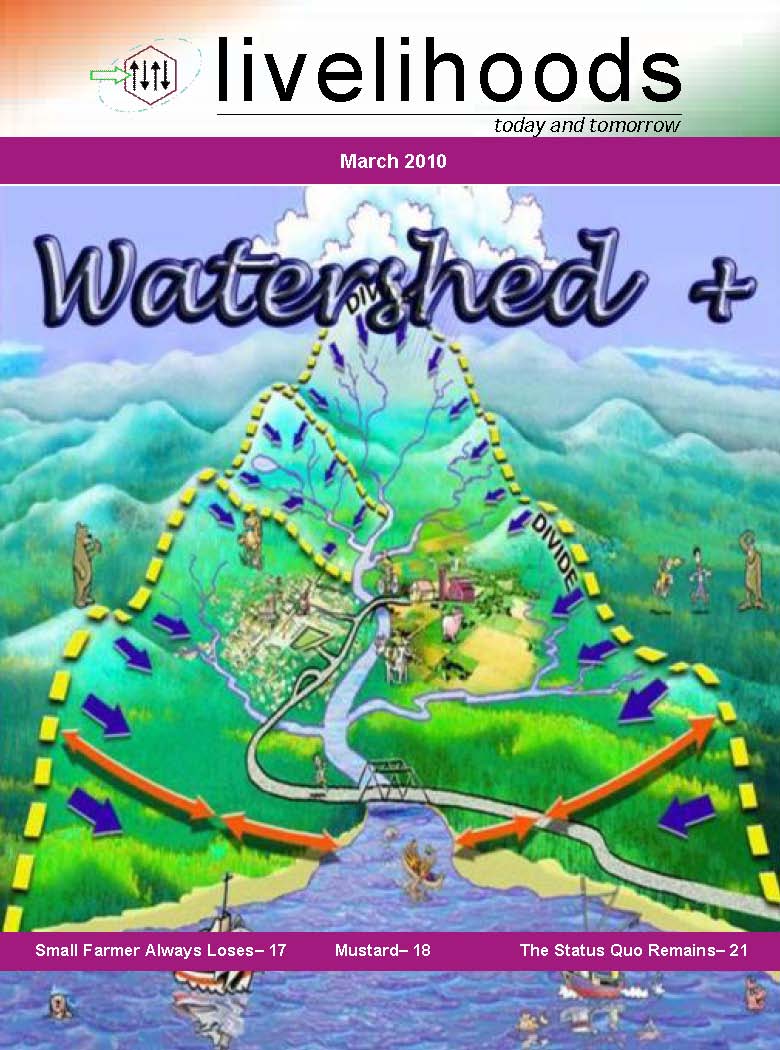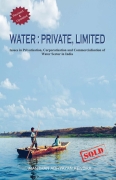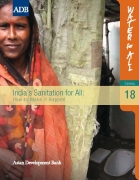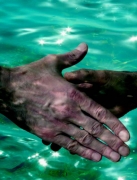/regions/india
India
Livelihoods magazine special issue on watersheds
Posted on 07 Jun, 2010 08:14 AM A special issue of the Livelihoods magazine (March 2010) brought out by the Akshara Network for Development Support Services, on Watersheds+.
A special issue of the Livelihoods magazine (March 2010) brought out by the Akshara Network for Development Support Services, on Watersheds+.
Increasing productivity of dry lands is possible through soil and moisture conservation (SMC) efforts results in growth led by increases in the farm output. Separate efforts are required to include the land-less and the vulnerable in this growth, so that they also realize the benefits of improved food security, increased employment and diversification of livelihoods. Such activities are known as ‘Watershed Plus’ interventions, and ‘livelihoods’ explores these activities.
National Water Mission under National Action Plan on Climate Change: Revised Comprehensive Mission Documents - Ministry of Water Resources (2009)
Posted on 05 Jun, 2010 11:46 PMThe National Water Mission (NWM), under the aegis of the Ministry of Water Resources, is one of the eight missions being constituted under the National Action Plan for Climate Change (NAPCC). The NAPCC was launched by the Prime Minister in 2009 as a nation-wide effort to tackle climate change.
IEC in Jalswarajya Project (Maharashtra) - A guiding light for water supply sector
Posted on 01 Jun, 2010 11:51 PMIEC in Jalswarjya- A guiding light for WSSD, Govt. of Maharashtra
- An article based on vibrant experience of Jalswarajya Project
Prabhakar S. Mishra
IEC specialist, Nagpur
Introduction
Whenever we are working on development front we need to put communication at heart place. Worldwide past experience suggest that modernization approach of development communication fail to sustain impact on stakeholders due to its vertical one way format based on prejudice which fix responsibility of being backward on under develop class. Till end of 20th century mostly communication in development sector was argument and advocacy based. Also efforts initiated with expectation of switch effect behavioral change, that outcast trust from communication.
Round up of the water news for the week ending 31st May 2010 : Six sewage treatment plants coming up in tsunami-affected areas of Nagapattinam, TN
Posted on 31 May, 2010 10:31 PMSome recent news items from the news feed that India Water Portal maintains at Newsrack: (http://newsrack.in/stories/arghyam/Water/55) :
- Six sewage treatment plants coming up in tsunami-affected areas of Nagapattinam, TN : https://www.thehindu.com/2010/05/31/stories/2010053157650600.htm
Water: Private, Limited - Issues in privatisation, corporatisation and commercialisation of water sector in India by Manthan Adhyayan Kendra
Posted on 31 May, 2010 02:44 PM This book by Manthan Adhyayan Kendra, highlights the emerging issues related to privatisation of water in the context of the recent surge of privatisation-related initiatives in the water sector in India.
This book by Manthan Adhyayan Kendra, highlights the emerging issues related to privatisation of water in the context of the recent surge of privatisation-related initiatives in the water sector in India.
The history of attempts at privatisation of water till recent times from all across the globe indicate that they have been met with strong resistance where ever they have been implemented. This is because of the total failure of all these programmes to address the social responsibility of providing water to all without consideration of profits.
However, this backlash against privatisation has led international donor agencies to use a different type of strategy and language. This has led to a shift from Private Sector Partnership (PSP) to Public Private Partnership (PPP) and more recently to the Water Sector Reforms (WSR) in countries such as India.
A simple and marvellous solution to clean ocean oil spills
Posted on 29 May, 2010 11:19 AMPlease have a look at the Demonstration video about clearing oil spills in oceans or any other water body.
http://video.godlikeproductions.com/video/CWRoberts_Presentation_2wmv
It is a simple and effective method.
The power of uncertainty: Reflections on the nature of transformational initiatives - Malcolm Adiseshiah Centenary Lecture by Mihir Shah
Posted on 26 May, 2010 11:21 PMIn this lecture, the author makes connections between the concepts of certainty and uncertainty and draws parallels between these and the scientific or the positivist approach and the phenomenalist approach. The author argues that the excessive emphasis on certainty, which is an inherent assumption of the scientific approach embraces reductionism, compartmentalisation and has been the principle underlying all disciplines such as developmental economics.
India's Sanitation for All: How to make it happen - An ADB report
Posted on 26 May, 2010 11:02 AM This discussion paper by ADB, examines the current state of sanitation in India in the context of the Millennium Developmental Goals, which call for a 50% reduction in the proportion of people without sanitation by 2015 and India's goal of providing Sanitation for All by the 2012.
This discussion paper by ADB, examines the current state of sanitation in India in the context of the Millennium Developmental Goals, which call for a 50% reduction in the proportion of people without sanitation by 2015 and India's goal of providing Sanitation for All by the 2012.
The paper targets policy makers, governmental ministries, state and local governments, non-governmental organisations, developmental agencies and all those who are involved in the planning and implementation of sanitation policies in India. It makes a few recommendations for the successful implementation of sanitation efforts in India.The focus of these recommendations is on household sanitation, which includes safe disposal of human excreta, as measured by household ownership of a sanitary latrine and household access to drainage facilities.
Negotiate: Reaching agreements over water - Paper by IUCN
Posted on 25 May, 2010 06:49 PM This book by IUCN is directed at practitioners involved in water-related negotiations that aim at fair and mutual agreements on optimum and sensible use of water by all. The book provides the necessary motivation, ideas, tools and inspiration for people involved in water negotiations throughout the world.
This book by IUCN is directed at practitioners involved in water-related negotiations that aim at fair and mutual agreements on optimum and sensible use of water by all. The book provides the necessary motivation, ideas, tools and inspiration for people involved in water negotiations throughout the world.
Many a times, the underlying approach to negotiations involves bargaining and competition. However, the book believes that emphasis on constructive engagement involving multiple perspectives and consensus building can lead to fair and equal distribution of this valuable resource to everyone.
The book is divided into five chapters that give out important key messages as to how to go about the process of negotiating:
Channel network delineation and catchment area demarcation of ponds: A GIS-based application
Posted on 25 May, 2010 03:06 PMContent Courtesy: GIS Development
Forwarded to the portal by: Sangeeta Deogawanka
Ponds are important sources of fresh water in the world as they store surface runoff produced by the storms. In this research paper, demarcation of the portion of land contributing runoff to ponds in village Nandgaon (Uttar Pradesh) has been done using topographical information of the surrounding area of the ponds, in a GIS interface.